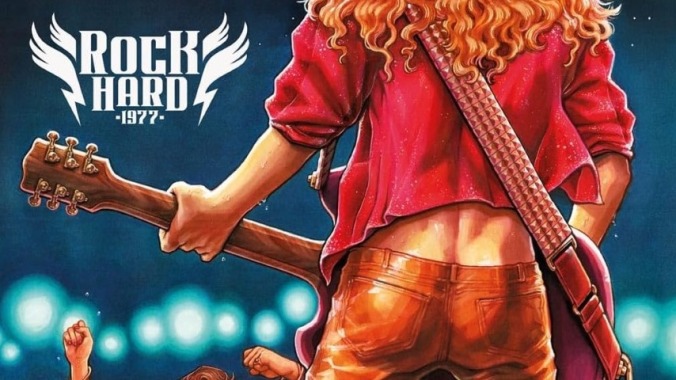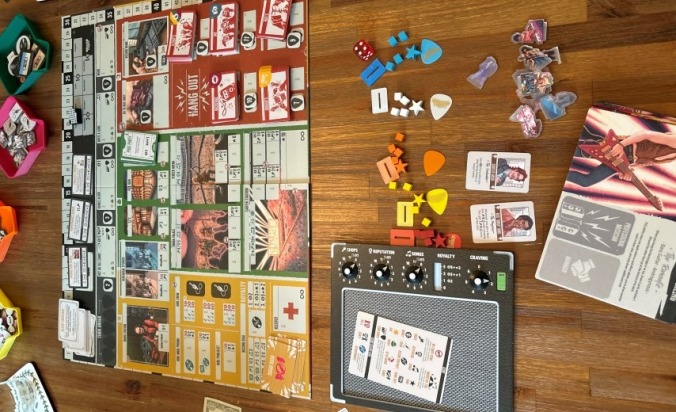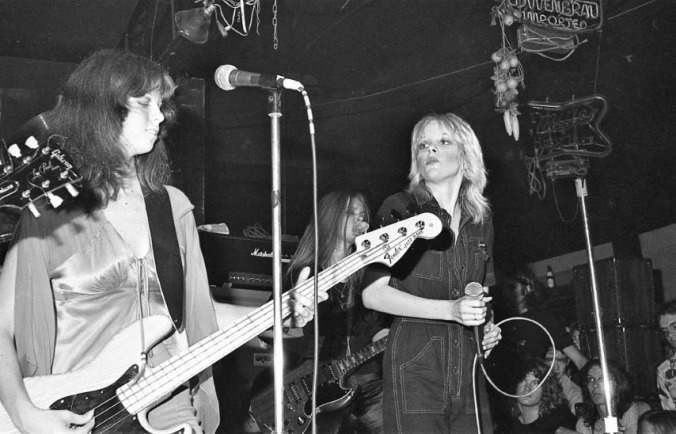Jackie Fuchs Talks Rock Hard 1977: From the Runaways to Board Games
Runaways photo courtesy of Getty Images
Jackie Fuchs has already done “famous.” Under the name Jackie Fox, she was the original bassist for the seminal 1970s rock band the Runaways, which spawned a couple of solo rock stars in Joan Jett and Lita Ford while inspiring a whole generation of women musicians. There was a documentary about the band in 2004, and a fictional movie about them for which Fuchs declined to license her likeness. Their biggest hit, “Cherry Bomb,” has over 213 million streams on Spotify, more than respectable for a song nearly a half-century old. Now, at 64, she’s experiencing a different sort of fame, thanks to a new set of fans.
“Being board game famous is weird,” says Fuchs. “I haven’t been (famous) for so long.” She appeared on the Youtube board gaming show GameNight in 2019, introducing her to a new audience, and now she’s becoming an even bigger name in the space thanks to her first board game design, Rock Hard 1977, based on her experiences in the music industry a half-century ago.
Fuchs defies just about any expectations you might have of a one-time rock star—although that hardly scratches the surface of her career or her life. After leaving the Runaways, she quit music entirely, went to UCLA to study linguistics, then to Harvard Law School where she had some classmate named Barack Obama, and later on became a four-time Jeopardy! champion. She reads about Russian history for leisure. She owns a hard copy of the Oxford English Dictionary, which she proudly showed me on our Zoom conversation. (I admit I was impressed, and a bit jealous.) And she’s always been something of a gamer.
“I had every board game as a kid,” she recalls. “Monopoly, Life, Candyland I’m reluctant to admit, Sorry, Trouble, Parcheesi, Mousetrap, Crazy Clock, Operation”—one gets the sense that she’s picturing a shelf in her memory and rattling off the titles in order—“we were big on games. We also played a lot of card games, especially cribbage, so I grew up playing games. And we played games in the car. Wordle we’ve been doing for a thousand years. All the little word games that were in the newspaper. But then you grow up and life intervenes, you start going to concerts, you get into sports, you study”—she does not mention the part about playing those concerts, merely going to them—“but when I was in college I played a lot of arcade and computer games. I don’t know if you remember Infocom (publishers of Zork and other text-based adventure games). You’d write KILL TROLL, and it would ask, ‘what do you want to kill it with,’ so you’d write KILL TROLL WITH AXE,’ and they got more sophisticated and puzzly and interesting.
“I went to work for Infocom as a play tester during my first year of law school which is crazy, nobody does that,” she says. “I tested a game based on Clavell’s Shogun and it was a terrible game. I had to play it over and over and over, and I thought ‘I think I’ll just focus on my studies.’ So I left but I met my ex there and we started playing D&D second edition and Shadowrun first edition, that’s how far back that goes.”
Fuchs graduated from Harvard Law in 1992, and like most young lawyers, had little time to breathe, let alone play role-playing or other games. “I was a film lawyer, when you have free time you are networking, I had to go see a lot of premieres which is not as fun as it sounds, and I tried to go to the gym to have some semblance of a life,” she says. She did go to some trivia nights, and when a friend from one of those mentioned he was trying to get back into D&D, Fuchs thought about doing the same. “The meetup that was closest to me said ‘come prepared with a L8 character generated,’” which, for folks unfamiliar with the game, is not exactly the way for someone who hasn’t played in 10 years to jump back in. “Then I saw right below it there was a listing for a board game meetup a few blocks away at a local pizza parlor, and I went, ‘you know what, I’m just going to go to that and see what kind of games they play.’ I walked in and got invited to this table and we played four really different games and I made friends with people because basically I played an alien and I ate them all. It’s a good way to make friends!”
Fox appreciates the board game hobby for the intellectual challenge, but also for the way it can bring disparate people together out of a common interest. “If you have friends who are a little bit socially awkward, it’s a way to ease into a conversation with them because you’re all sitting around doing something you love,” she explains. “You can just sit down with people and get to know them for who they are. Maybe you find out after you’ve fallen in love with a group of people that they have very different viewpoints than you do.”

Rock Hard 1977 works like a lot of games in its weight class, with some light worker placement, some end-game objectives, and some simple set collection elements, but it is the theme that sets it apart and has driven so many positive reviews. Fuchs based the game play and its narrative elements on her own experiences in the music industry, both as a musician and as an entertainment lawyer.
“I found out through a music writer friend of mine, that he had been talking about my game with Steve Miller—yes, that Steve Miller,” Fuchs says. “(Miller) was writing joke board game moves back to him, and they were exactly the kind of events that mess you up. As my friend put it, he’s been living this for his entire life! I felt validated having a few events that just mess with your planning because that’s what happens when you’re in a rock band.
“The Runaways were booked for some reason to open for Bob Seger in Philadelphia, and we had to drive from the Midwest all night to get there. We get to the hotel at like seven in the morning, get into bed, fall asleep, get woken at noon for an interview, and immediately get told, ‘oh, by the way, the gig is cancelled for tonight, Bob Seger’s drummer broke his leg and they can’t find a sub.’” (Seger’s drummer, Charlie Martin, had been hit by a car while walking, breaking both his legs and leaving him paralyzed from the waist down.) “That was when I looked at a map, learned where Philadelphia is, realized how close it was to New York and went see ya! I’ll go buy a ticket to Texas, because this is how brilliantly we were booked, from the Midwest to Philadelphia to Texas. Like, genius. So I just went off for a couple of days in New York. So in the game, you can be planning your stuff for an entire turn and it’s gonna get foiled. But the more you play the game, you start to know what cards you might see that you haven’t seen and you plan around that.”
